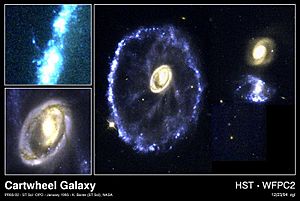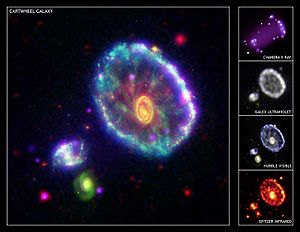Cartwheel galaxy facts for kids


The Cartwheel Galaxy (also known as ESO 350-40) is a special type of galaxy that looks like a wagon wheel. It is about 500 million light-years away from us. A light-year is the distance light travels in one year. This galaxy is found in the constellation called Sculptor.
The Cartwheel Galaxy is quite large, stretching about 150,000 light years across. This makes it a bit bigger than our own Milky Way galaxy. It has a lot of material, weighing about 2.9 to 4.8 billion times the mass of our Sun. It also spins very fast, at about 217 kilometers per second.
A scientist named Fritz Zwicky discovered this unique galaxy in 1941. He described it as "one of the most complicated structures" he had ever seen. The Cartwheel Galaxy has visible "spokes" that look like bicycle spokes. These spokes are made of gas and dust.
Contents
How the Cartwheel Galaxy Formed
Scientists believe the Cartwheel Galaxy was once a normal spiral galaxy. This means it had long, winding arms like a pinwheel. About 200 million years ago, something dramatic happened. A smaller galaxy crashed right through it!
The Galactic Collision
When the smaller galaxy passed through the Cartwheel Galaxy, it created a huge impact. This impact sent a powerful shock wave rippling through the galaxy. Think of it like a stone dropping into a pond, creating ripples. This shock wave moved gas and dust at very high speeds.
The Starburst Ring
As the shock wave moved outwards, it squeezed the gas and dust together. This squeezing caused many new stars to form very quickly. This burst of new star formation is called a "starburst." This starburst created the bright, blue-colored ring we see around the galaxy's center.
Returning to Normal
After the collision, the Cartwheel Galaxy started to change. It is slowly beginning to look like a normal spiral galaxy again. You can see new spiral arms, which are the "spokes," spreading out from its middle. Scientists are still studying other ideas about how this galaxy got its ring shape.
See also
 In Spanish: Galaxia Rueda de Carro para niños
In Spanish: Galaxia Rueda de Carro para niños
 | Stephanie Wilson |
 | Charles Bolden |
 | Ronald McNair |
 | Frederick D. Gregory |

